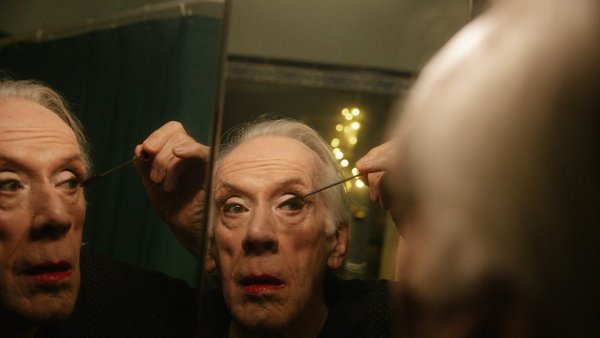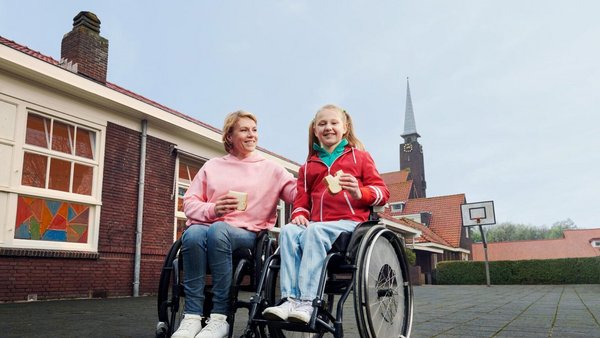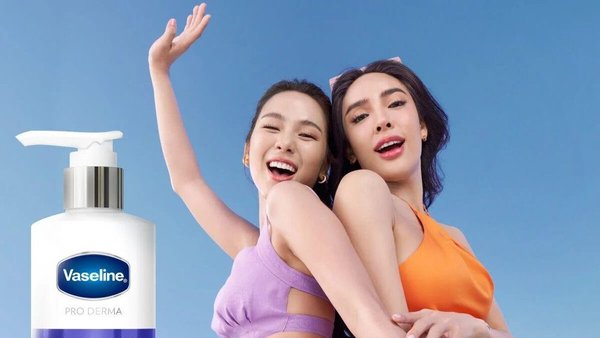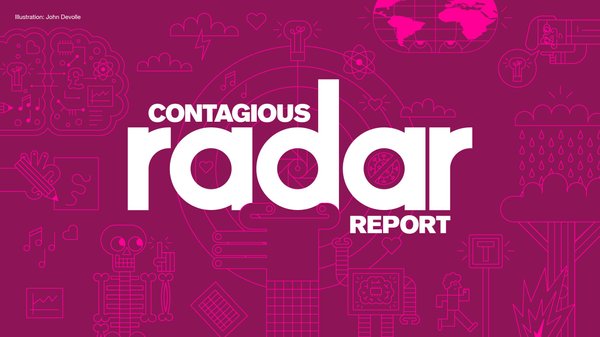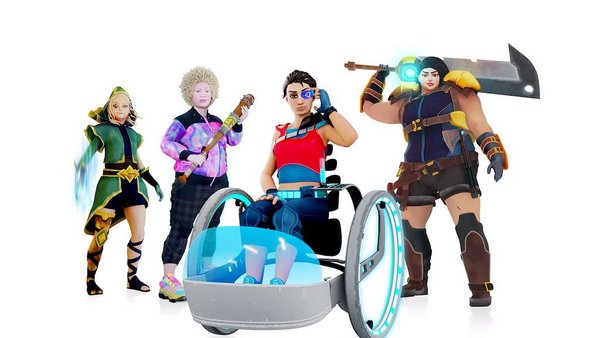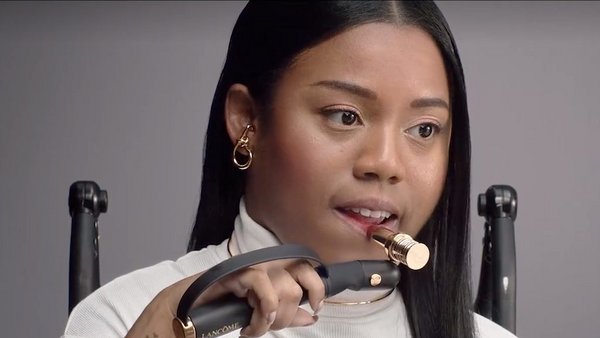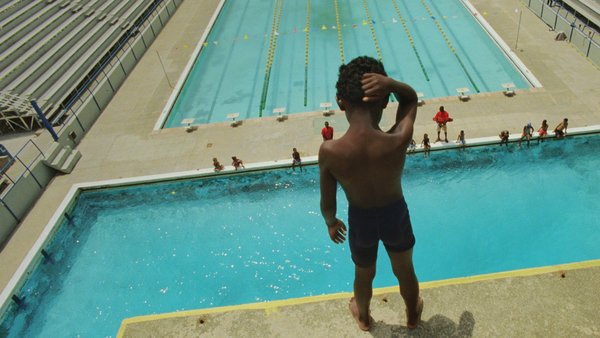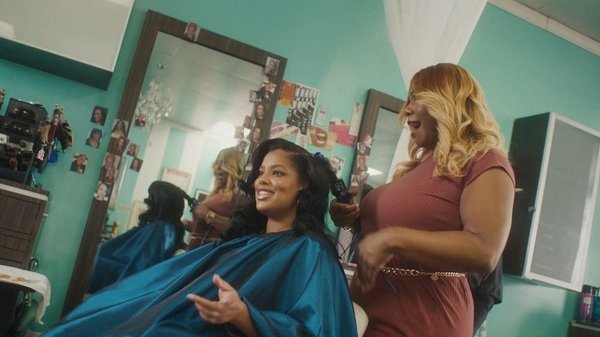Virgin Atlantic’s new brand platform, developed with Lucky Generals in London, is a celebration of the airline’s iconoclastic spirit. Called See the World Differently, the platform launched in April 2022 with a TV ad showcasing the individuality of Virgin Atlantic's crew and customers.
The ad, which takes placed on an A350 jet, features a crew member with sparkly eyeshadow, a passenger with a bedazzled wheelchair, and a passenger with tongue piercings. The ad is set to a cover of ‘I Am What I Am’, originally performed by Gloria Gaynor.
In addition to TV, the ad also ran across video on demand, digital out-of-home, social and digital.
Following the launch campaign, Virgin Atlantic is releasing a series of tangible initiatives that reflect how the airline ‘sees the world differently’. In September last year, the airline announced a change to its uniform policy, meaning that staff are no longer bound by gender constraints when it comes to their uniform and can wear whatever they feel most comfortable in. The policy was brought to life via an online film, Runway on a Runway, showing crew members and influencers, including Drag Race’s Michelle Visage, modelling the uniform on a runway.

Results / In the period from the campaign launch until March 2023, Virgin Atlantic reported that ‘brand power’, which measures share of consumer demand driven by brand associations, has grown 1.7% year-on-year. Virgin Atlantic reported a 15% increase in communications awareness and a 55% increase in comms awareness amongst their core target.
According to the brand, it has seen a 22% increase in perceptions of Virgin Atlantic being an ‘inclusive’ airline, a 13% increase in Virgin Atlantic being seen as an airline for ‘someone like me’, and a 15% increase in associations of being an airline with a purpose. Virgin Atlantic has also seen a 14% uplift in consideration since the campaign launched.
While the brand says that traditionally visitors to VA.com dip during Q2, this wasn’t true after the campaign went live, and visits continued to grow throughout 2022. The number of bookings made through the website were significantly higher across 2022 versus 2019. Runway on a Runway saw 56 million impressions from paid social and 8 million via organic social. The video racked up 1.4 million views on Instagram, making it the airline’s most viewed content to date. The campaign helped supercharge recruitment with the airline reporting 10,000 applications for 800 frontline crew roles.
Almost a year after the launch of the platform, we spoke to Annabelle Cordelli, senior vice president global marketing at Virgin Atlantic, and Alice McGinn, planner at Lucky Generals, to find out about the thinking behind the platform.They told us:
- The work was designed to encourage existing customers to choose Virgin Atlantic once more and reach out to new customers
- A core insight driving the campaign came from the airline’s head of crew who explained that Virgin Atlantic’s people see the world differently
- It was important for the brand platform to be built on tangible evidence of how Virgin Atlantic is different

What were the challenges for Virgin Atlantic when you put the business out to pitch?
Anabelle Cordelli: It was an incredibly challenging time through the pandemic. During that period we were confident that we were going to re-emerge, but it was May 2021. There were lots of unknowns. We were still in lockdown.
Everyone was like, ‘There will be a future but it’s going to look different.’ So the brief was, ‘How are we going to step into a new era of travel?’ Keeping in mind that everyone was reassessing their lives from top to bottom, thinking about their priorities, the brands they’re choosing, the role of travel. It felt like a really important moment for us to step forward and represent what we stood for in that new context. From a business perspective, we had to do that so that we could get people flying again and holidaying again, both our existing customers (who had experienced us for many for years at that point), and also new people. We knew there was a huge amount of pent-up demand and we needed to give people the confidence to come and travel with us.
Annabelle Cordelli, Virgin Atlantic
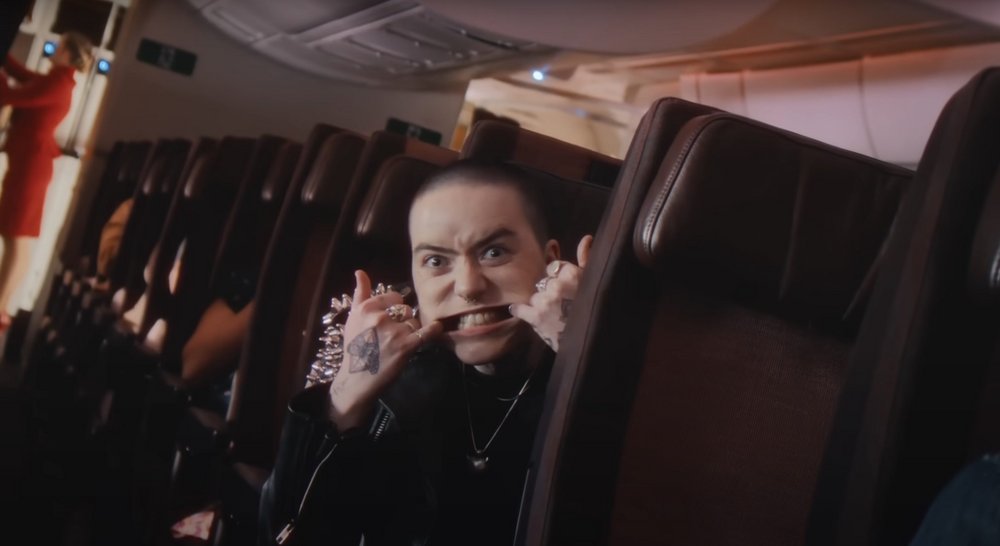
So was it about reintroducing Virgin Atlantic to the world?
Cordelli: I think it was. Most people, certainly in the UK and a lot in the US, know who Virgin Atlantic is, but with so much change it was about ‘what is it about Virgin Atlantic now that’s relevant to me’. A lot of the things that we’ve always stood for still stand true today. It was just thinking about how we would express that.
The brief was, ‘How are we going to inspire millions of existing customers, but also new customers to come and experience Virgin Atlantic?’ That brief was not just about a campaign, it was, ‘How do we come up with a brand platform that would endure for the next decade, that would give us that anchor to draw inspiration and guidance from?’
Alice McGinn: You get pitch briefs that are ambitious, but they are very often communications-focused, whereas this was always much, much bigger. How do we recreate this brand for a new era and how do we take it forward for the next 10 decades. We’re launching a new chapter of work in April, but we’re going to be thinking about new products and new services. That was what made the pitch quite interesting from Lucky Generals’ perspective, because it’s quite rare.
Alice McGinn, Lucky Generals
How did you come up with the idea for the brand platform? Did you do any research that informed it?
McGinn: We did some quant and qual as part of the pitch but also during the time that they were locked down and grounded, it wasn’t like any time was wasted. [Virgin Atlantic’s] research helped us get under the skin of our audience and the degree to which the pandemic has changed everybody. We saw that people were completely reassessing their lives in terms of how they work and what their attitudes to travel were. We’ve seen that travel became even more important to people than it was previously. It’s that classic thing; when you take something away, it becomes more important.
Also, while we were all locked down, there was a cultural revolution taking place, particularly in America with the likes of the Black Lives Matter movement. We’d also seen that it wasn’t just the practical sort of ways that people were living their lives differently but fundamental value shifts about what people cared about.
So we had that from the consumer perspective and then Annabelle set us the challenge, ‘What do we take forward about this brand from its past to make it relevant for the future?’ The thing that felt incredibly relevant to take forward was the fact that Virgin Atlantic has always been different. It was a guy who started a record company then decided he was going to get into aviation. Now they’ve brought out salt and pepper pots that you’re invited to steal, invented ice cream with the movies. It’s such a ‘story brand’ in terms of always bringing this fresh perspective to aviation. How do we take the fact that this is a moment in time when people are fundamentally reassessing their lives and marry that with the iconoclastic spirit of Virgin Atlantic at its very, very best? That’s how we got to the platform. How do we see the customer experience differently for a new era of aviation? How do we see customer service differently? How do we see product development differently? It was something we could begin to apply to every part of the business, not just the communications.
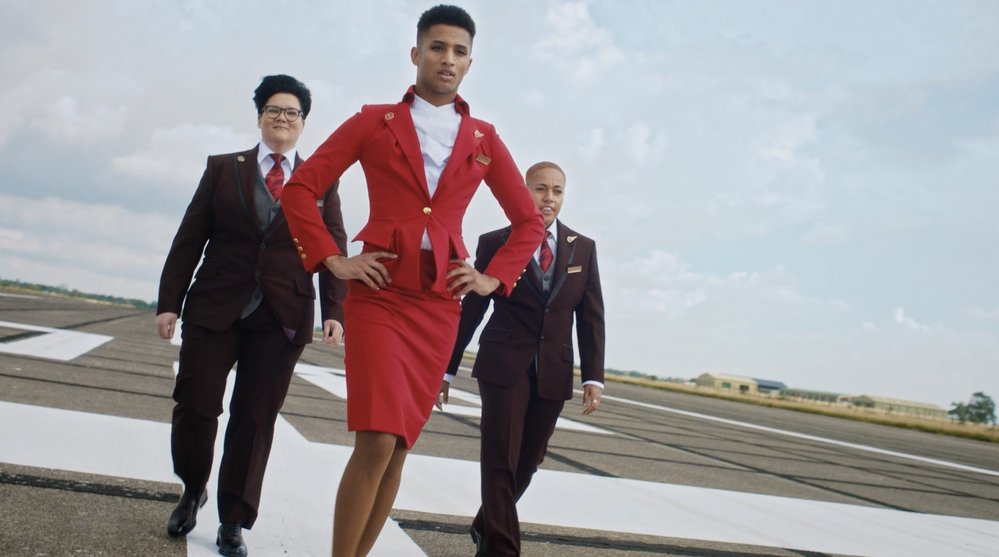
What values sit beneath that brand platform?
Cordelli: People have always been at the heart of Virgin Atlantic. Individuality, diversity, inclusion: these values have been part of the Virgin Atlantic culture since its inception. We really champion individuality. It’s something that we pride ourselves on. We have an internal manifesto around ‘be yourself’ and that’s existed for a long time. It’s just more relevant now than ever.
Alice McGinn, Lucky Generals
So how did you get from the platform to the first piece of creative?
McGinn: We obviously had a huge commercial objective: we had to get millions more people flying with us because we had been grounded for so long. We very strongly felt that we wanted the first expression of the brand platform to be built on tangible evidence of how Virgin Atlantic is different. So Annabelle and I went on a bit of an adventure across the business to uncover all the things that made us different, from the fact we’ve got loos with a view to...
Cordelli: ...the youngest, greenest fleet.
McGinn: We were the first airline to create social spaces in the sky, and we’re evolving those now from just being bar spaces to more hybrid spaces. But the most powerful expression actually came through a conversation with Virgin Atlantic’s head of crew who told us that Virgin Atlantic’s people see the world differently. They’re a brilliant embodiment of the platform. Unlike other airlines where crew members are trained to literally follow a script, Virgin Atlantic doesn’t have that. People aren’t told to do things robotically in a ‘Virgin Atlantic way’. Virgin Atlantic actively encourage people to be themselves. They don’t want a group of people who are all kind of lemmings, who will do things in exactly the same way. She was telling us that they recruited not just from aviation, but looked for people who are just really good people-people. That for us was a real ‘aha moment’: the most powerful expression of our brand, and our difference, is actually our people.
We married this with an insight about our customers, and potential customers, who we also discovered, see the world differently. They are people who love travel, they want it to be glamorous and premium and playful. They don’t really want the formality that sometimes comes with long haul travel. Our customers always say that they love Virgin Atlantic because they feel like they are treated like an individual. They could be in upper class or in economy, but they will feel like they’re being treated like a special individual. Our people bring their whole selves to work and we’re going to treat you like an individual too. It’s a philosophy that we brought to life in I Am What I Am.
Annabelle Cordelli, Virgin Atlantic
How did you go from the creative to some of the tangible outcomes, like changing your uniform policy?
Cordelli: The uniforms came a bit later. Off the back of the campaign, we found a huge increase in people wanting to come and work at Virgin Atlantic. A much broader range of people wanted to come and work at a place like Virgin Atlantic. A couple of people who joined in this new cohort of cabin crew sparked the conversation around the uniform. We want people to feel themselves, what does that look like? What could we do around uniform so that everyone could present in the way that they felt most comfortable? There was a brief conversation about whether the uniform needed to change but it's such an iconic piece of Virgin Atlantic and people wear it with absolute pride. So that led us to realise it's not about the uniform, it’s about the uniform policy. We worked hand in hand with our people team to adjust that and say, ‘You can wear the uniform the best represents you.’ That felt really positive because it built on the tattoo policy that came before that. Ideas can come from everywhere. Some of them, the tattoos and the uniforms, both came from conversations with people internally and we then made policy changes. Right now, we’re thinking about what other opportunities are there to champion change that’s meaningful in pursuit of what our customers want or what our people want.
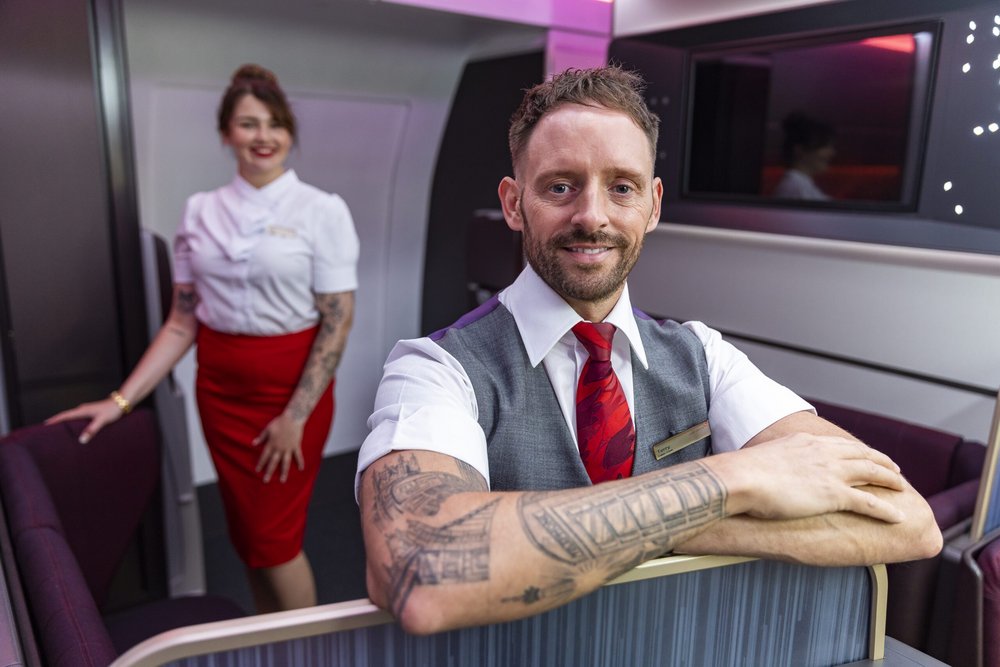
It feels like inclusivity is a really important part of your messaging. How do you get it right?
McGinn: I think that the short answer is in consultation with the communities that you’re representing. Virgin Atlantic have a series of brilliant internal networks. And we consulted first and foremost with Virgin Atlantic colleagues from those communities. They played a central role in helping us across both the campaign, but also Runway on a Runway [the uniform change], that our intent was landing positively, through to very practical guidelines around the preferred language we should be using.
It definitely wouldn’t have been the work that it is without the support from the internal teams. And then we worked with an external organisation that connects you both with people from the communities you’re looking to represent, but they’ve also got a dual expertise, which is they come from the world of filmmaking or academia or marketing. So they’re quite uniquely placed to help guide what we were trying to do.
How did the insights from those communities come out in the work?
McGinn: For example, on the main TVC film, the external organisation connected us with individuals that we were looking to represent in film. We really deep dived with them and said, ‘What we’re trying to do is create a character as this spot is all about individuality.’ They really helped us understand who that character might be as an individual. So, we worked with an older black gentleman, you see him in the upper class bit of the plane, sitting in the loft area, a brilliant talent called Redd Pepper. And he just opened our eyes to things. Like we’d share the wardrobe and he was like ‘There’s a difference between West Indian and West African suits and styling.’ He suggested how this character might carry himself and his mannerisms. There’s a moment where he’s got some bracelets, which he shakes, and that came from him. We wanted to create a real understanding of who the characters might be as an individual and make them feel authentic.
There were definitely moments of tension because you’ve got to marry the insight that you’re getting from the different communities with the vision that the director had for the film. And there were things that we we pushed in the film because we wanted it to be gorgeous. I mean, not every single wheelchair user has a diamante-encrusted wheelchair but we wanted to create something that was visually spectacular.
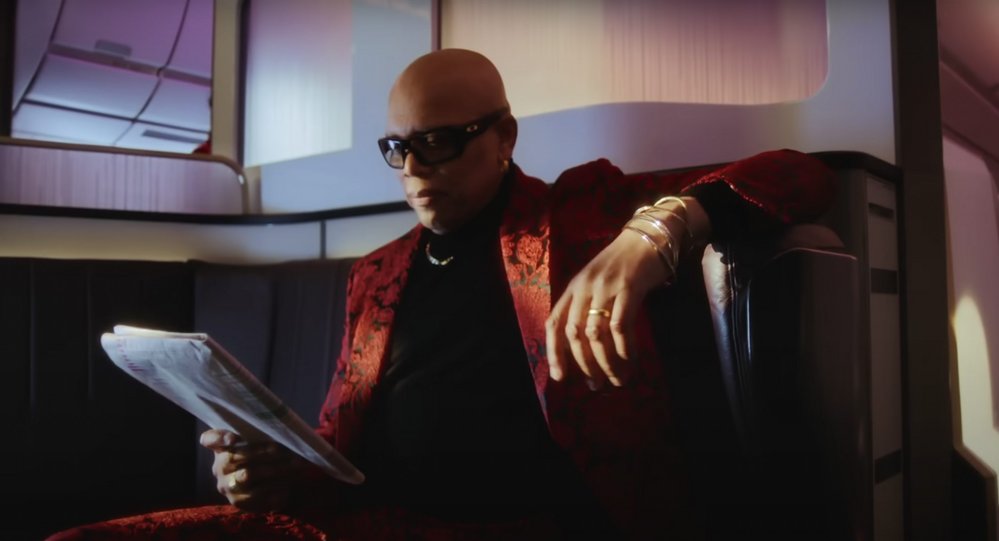
Can you speak to any of the KPIs of I Am What I Am?
Cordelli: I’m pleased to say it has been effective. So from a brand perspective, all the sort of metrics that you would look for in terms of driving consideration, perceptions around the brand all growing and the things like, ‘Is it a brand for me’, ‘Is it a purposeful brand’. All the things that you would want to see moving are all moving. Obviously that’s all good but only if those perceptions translate into ‘and I want to buy a holiday with you or a ticket to fly with you’. We’ve had an exceptional commercial performance, as well. On top of that, as I mentioned before, more and more people want to come and work at Virgin Atlantic. Really importantly, the diversity of the talent is changing as is the openness of people disclosing things like hidden disabilities because they feel comfortable to do that at Virgin Atlantic. Of course, internally, people are really proud about what we’re doing.
McGinn: I can’t overestimate how important the recruitment piece was.
Was recruitment a goal going into the campaign?
Cordelli: No, it was just an added benefit. But what was intentional was to make sure that the brand was strong and would be attractive to people and that would ultimately drive our commercial performance.
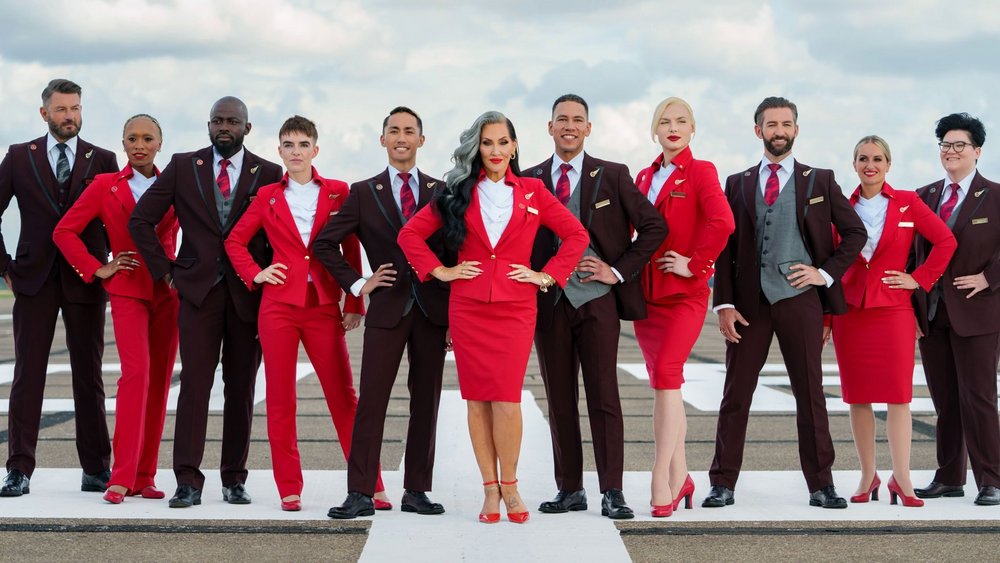
Can you explain why you set out to have tangible aspects to bring the platform to life, beyond the communications. What else are you planning to do?
Cordelli: If you’re just talking and you’re not doing and not acting, then I’m not sure that that’s going to be enough. We had the tattoos policy and the uniforms, which were the two shifts last year. Right now, we are talking about what next. And absolutely I can say that the intent is that we will continue to champion change and that can mean in all sorts of spaces, whether that’s in sustainability, whether it’s D&I or wellness. What are those spaces that are important to people and how do they relate to travel and Virgin Atlantic. There’s absolutely a commitment there now that we have the beginning and momentum to keep going.
McGinn: Just in December, it was announced that Virgin Atlantic are going to fly the first ever transatlantic flight flown on 100% sustainable aviation fuel. So, as Annabelle says, it’s not just around diversity and inclusion, but also how we use our platform to bring to life how we lead the way and see things differently. If we didn’t have tangible evidence of our difference, then it would be really difficult from a creative and communications perspective. We’d be stuck in a narrow playground. We’ve all seen a travel montage of people jumping off a cliff into some lovely blue water. We’ve all seen people riding on the back of a motorbike on the open road. Any airline or travel brand can do that. So we really need some differentiating, distinctive things to talk about when it comes to us and what we do.
Alice McGinn, Lucky Generals
What were your greatest learnings from the campaign?
Cordelli: My biggest one is you need to be in it together and invest the time. It was literally every day or every other day that we were in the room discussing, debating.
McGinn: The people who don’t work on Virgin Atlantic at Lucky Generals were like ‘Have they moved in?’
Cordelli: Linked to that, you really do need the perfect partner. [Lucky Generals] just feels like an extension of the team.
McGinn: From an agency perspective, often lots of clients talk quite a good game about wanting to do initiatives and activations rather than traditional communications but all too often they get forgotten about. But Virgin Atlantic and Annabelle’s team did not do that. Just when you think you’re going to relax after the campaign launch, they were like ‘Right, the next step is this...’. What I learned from doing that is that small gestures can mean a lot.
On paper the request that we got from our internal crew members around making an adjustment to the uniform policy was a really small thing. They could have dismissed it and gone, ‘It is only going to affect a few people, so why bother talking about it?’ But we saw actually that a small gesture means a lot, not only to the people it directly affects but to our broader colleagues and people in the world at large.
I also come back to working with our internal networks and external partners to really understand how to bring those different characters to life. There’s so much there that I just would never have known if I hadn’t had those conversations.
